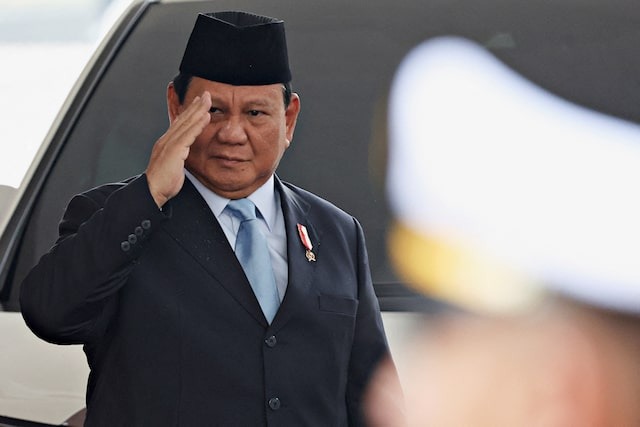

Burhanuddin Abdullah told a business forum that the new government could save up to 200 trillion rupiah ($13.3 billion) with well-targeted energy subsidies.
"We want to improve data ... so that subsidies can be given as cash transfers directly ... to families that deserve it. That's what we're going to do," he said.
The 2025 budget has planned spending of 3,621 trillion rupiah but most of that will go towards debt repayment and other obligations, so savings are needed to fund new programmes, he said.
Indonesian President-elect Prabowo Subianto gestures as he attends the annual State of the Nation Address at the parliament building, ahead of the country's Independence Day, in Jakarta, Indonesia, August 16, 2024.
Fuel subsidies were 500 trillion rupiah last year, accounting for around 16% of budget spending. Indonesia currently subsidises certain types of fuel and electricity tariffs, a policy that has kept inflation low but has exposed state coffers to swings in global oil prices.
Burhanuddin also said private companies will play an important role in helping Prabowo - who takes office on Oct. 20 - with his goal of lifting economic growth to 8% from 5% currently as they will be invited to invest in infrastructure projects such as seaports.
Deputy Finance Minister Thomas Djiwandono has also told Reuters Prabowoseeking foreign investment in public-private partnerships for the management of airports.
The government will work to smooth the investment process, he said, noting rate cuts in Indonesia and abroad will be helpful to the economy. He added that he hoped the Indonesian central bank - which cut its key policy rate by 25 bps to 6.00% this month, just ahead of the U.S. Federal Reserve's cut - will reduce rates further.
Burhanuddin, who was the country's central bank governor from 2003 to 2008, said the incoming government will also look to deepen local financial markets as part of a drive to retain export receipts in domestic markets.
"One of the goals is to make investors are comfortable to save their money (in Indonesia)," he added.
The current government has been trying to make exporters, especially in the natural resources sector, comply with a rule on retaining foreign exchange earnings in an effort to boost foreign reserves after the rupiah came under pressure earlier this year.
According to Reuters








